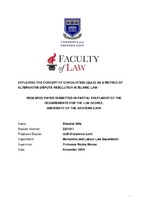Exploring the concept of conciliation (ṣulḥ) as a method of alternative dispute resolution in Islamic law
Abstract
This research will chart and navigate the early stages in the development,
conceptualisation, and formulation of Islāmic law and the concept of ṣulḥ as a
mechanism of legal redress in Islāmic law (Sharī’a). The research shows that firstly,
the mechanism is deeply rooted and embedded in scriptural (Qur’ānic) and extrascriptural text namely the corpus of Ḥadīth. There is a plethora of instructions to prove
that reconciliation is indeed a lofty goal which is rewarded as an act of worship. Like
many other aspects of the Sharī’a, ṣulḥ is regulated by provisions of the scripture and
extra-scriptural sources considered by Muslims as the (Sharī’a). Secondly ṣulḥ is also
the preferred method of alternative dispute resolution because it is fluid, contractual,
expeditious and one of the most effective ways of solving different types of disputes,
whether commercial or family. It has therefore gained considerable traction in modern
western financial industry which I think is largely due to its contractual nature and the
absence of the adversarial element. As a mechanism of redress, ṣulḥ is governed by
Islāmic law of contract which takes the form of an agreement which can be mutually
negotiated between two or more parties. Of late it has also become the mechanism of
choice in family and marital disputes.

